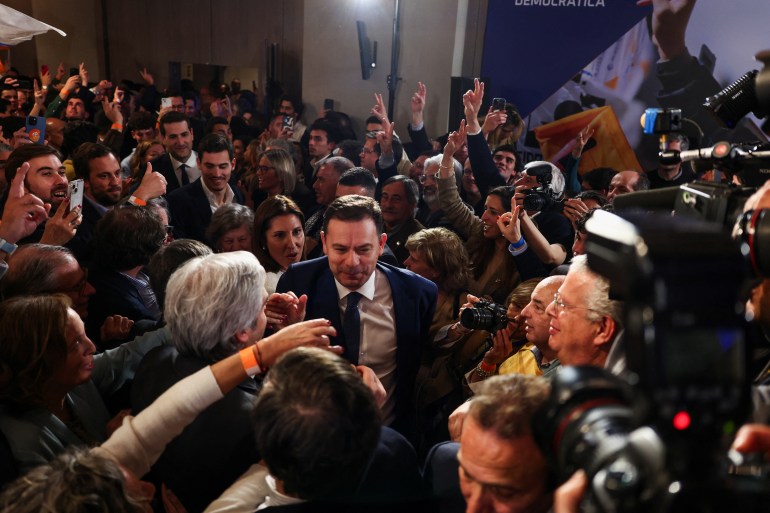When the March elections in Portugal saw the hard-right political party, Chega, quadruple its parliamentary representation from 12 seats to 50, one conclusion appeared overwhelmingly obvious. Overnight, it looked as if Europe’s most westerly country had become the continent’s latest front line between populist, ultra-conservative parties enjoying surging support and more traditional, centrist formations facing crumbling voter backing.
The Chega electoral earthquake – and the narrowest of victories for the centre-right Democratic Alliance (AD) coalition over the incumbent Socialists by just 80 seats to 78 – showed how voter support for the two main parties had slumped to its lowest level since 1985. But when it comes to running the country, albeit with much shakier support than they would like, for now Portugal’s long-standing political establishment remains at the helm.
On April 2, Luis Montenegro, whose conservative Social Democratic Party (PSD) constitutes AD’s principle component, is set to be sworn in as leader of a new minority government, and he will do so without counting on default parliamentary support from the hard-right “new kid on the political block”.
“Governing under the current circumstances is anticipated to be challenging,” warns Sofia Serra-Silva, a political scientist at the University of Lisbon’s Social Science Institute. “The new government will navigate a fragmented parliament, with the Socialist Party strongly established as the opposition and Chega applying pressure from the right. For the AD, securing a simple majority will be a complex task.”
So, while the PSD celebrates its return to power for the first time since 2015, the question of how a minority centre-right government will successfully legislate its policies – while avoiding a power-sharing agreement with Chega – will be central to the country’s political future.
That dilemma, in turn, overlaps with a second, more deep-rooted issue: How will a political establishment with an apparently chronic case of withering electoral support handle Chega’s seemingly relentless rise in the polls?
‘Cordon sanitaire’ unlikely
Both predicaments have parallels across Europe, but Serra-Silva argues that the idea of a “true cordon sanitaire, meaning complete non-cooperation” – as is the case in Germany, for example, between the traditional parties and the hard-right Alternative for Germany (AfD) – “in Portugal seems unlikely”.
“Despite the centre-right party leader’s campaign assertion of no coalition with Chega, internal opinions and past collaborations, like Chega’s support for PSD in Azores, suggest a more nuanced stance.”
“The ‘no means no’ statement [by Montenegro] referred only to cabinet formation, not precluding other forms of cooperation.”
Meanwhile, grassroots voter-level concern is rising in some quarters about how Chega’s ideas are becoming increasingly mainstream, paralleling their sharp rise in political influence.
“I am concerned because of the election result but also because I think the attitude of Portuguese people towards these kinds of politics is changing a bit,” says Alexandre Pinto, a language teacher in Lisbon.
“The taboo towards displaying racist or xenophobic attitudes is disappearing and the end result is Chega. Of course, these things don’t change abruptly. But perhaps what was hidden has now become more open.”
While Serra-Silva says a clear-cut cordon sanitaire in parliamentary politics is very unlikely, Pinto argues that on a practical level, some kind of agreement is needed between the traditional parties to handle the rise of a party as notoriously volatile as Chega.
“I wouldn’t call it a cordon sanitaire – the Socialists have already had that discussion. But when it comes to solid policies for defending democratic values, I believe understanding between the two traditional parties must be reached, because, basically, we don’t know what Chega will do.”
The events in Portugal’s parliament last week, where Chega backtracked on an agreement with the PSD over their votes for parliamentary president and vice-president – positions of largely symbolic importance – highlight the complexities the government faces in navigating agreements, Serra-Silva says, and “showcase how the far-right has disrupted Portugal’s traditionally stable two-party system”.
On the other hand, Serra-Silva argues that historically, finding common ground on numerous policy issues for the two main parties, the PSD and Socialists, has proved possible. She points to a Socialist offer of support on March 19 for a rectification of the 2025 State Budget in order to prioritise the welfare of key public-sector workers as one such area where potential new deals could be struck.
According to Serra-Silva, Luis Montenegro’s future strategy hints at bypassing parliament when necessary and governing by decree, “reflecting a practical response to legislative hurdles”.
“However, this approach has its limitations, as evidenced by the recent difficulties encountered during the election of the Parliament’s president,” Serra-Silva says. “Given these constraints, the question arises: Will Montenegro seek support from Chega or the Socialists?”

Can minds meet?
Meanwhile, the idea of using persuasion and discussion to enable society to absorb the shock waves caused by the far right also has its grassroots supporters. Among them is Dr Francisco Miranda Rodrigues, president of one of Portugal’s top associations of mental health professionals, the Ordem dos Psicologos Portugueses.
“If we want more progressive ideas to have a place in the future, we have to deal with a context in which there are a lot of people who don’t think in a progressive way,” he argues.
“If we just fight this, rather than talking to other people who think in a different way, we are doing just the opposite of what we want to happen. We are just adding more fuel to the fire, and we are going to render both sides more extreme.”
His idea that it is by no means impossible for mainstream society to engage in dialogue with Chega voters – and perhaps return them to mainstream politics in the process – was already in circulation on election night. Even as the votes came in, Pinto points out, Socialist Party leader Pedro Nuno Santos said that while more than one million people had voted for a hard-right party for the first time, their support had elements of a protest vote, not because they necessarily agreed with Chega’s xenophobic policies. “I’d like to think he’s right,” Pinto adds wryly.
In Portugal, one key test of the government’s potential to go the full-term distance will be passing the 2025 state budget this autumn. “Securing an absolute majority to do that will be challenging,” says Serra-Silva. But even before that, in June’s European Union election, Chega’s rise in popularity will likely contribute to the far-right’s predicted gains across the continent.
“Exit poll data from the latest national elections in Portugal indicate that many of Chega’s voters came from abstention, making them irregular voters and casting uncertainty on their turnout in June,” she concludes.
But despite this, she adds, the prevailing expectation is that Chega will secure some MEP positions, contributing to the anticipated right-wing rise in the European Parliament elections. “Polls suggest a significant impact, with predictions that the nationalist right and far right could secure nearly a quarter of the seats in June.”
As for whether Portugal’s current predicament with Chega can be a lesson for European democracy, Pinto says: “I think that’s the million-dollar question. In Spain, say, [hard-right party] Vox is not as relevant as they have been, but if you look at France or Italy, the extreme right is rising and seems to be here to stay.”
“I’d like the foreign moderates and democrats to learn from what’s happened in Portugal, but I think we have to see that the extreme right is more relevant than it was. I don’t know if those winds of change can stop now.”







